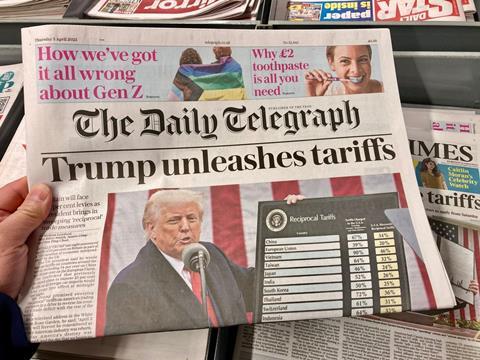Trump tariffs could benefit housebuilder if interest rates fall, says analyst
Barratt Redrow expects to meet its homebuilding targets for the financial year, the firm has said as it reported a slump in forward sales.
In a trading update for the 13-week period from 30 December 2024 to 30 March 2025, the recently merged housebuilding giant said it had delivered 3,717 homes, slightly more than the 3,662 built in an equivalent period the year prior.
Some analysts have speculated that US president Donald Trump’s tariffs could cause UK inflation, and subsequently interest rates, to drop, with potential benefits for housebuilders like Barratt Redrow.
The latest figures brought the total number of homes built by the firm in the financial year to 10,563, with Barratt Redrow expecting to deliver its previously announced target of total completions between 16,800 and 17,200, including around 600 joint venture home completions.

However, the trading update also showed that forward sales had fallen in both number and value.
The total number of forward sales fell 10.1% to 10,245, while the value of sales were worth £3.14bn in the period, down 2% from £3.2bn in the previous period. This was largely on the back of a 12.1% decline in the value of forward sales of affordable housing, which dropped from £848m to £745m.
Meanwhile, the value of forward sales of private homes actually rose 3.3% from £2.17bn to £2.24bn, despite a 3.5% drop in the total number of private homes sold.
The housebuilder’s private home order book stood at 5,503 homes, 3.5% lower in terms of volume relative to the position a year ago, but ahead by 3.3% in value terms at £2.24bn.
It recorded a net private reservation rate of 0.62, 1.6% higher than in the comparable period last year.
Barratt Redrow was created last autumn by the £2.5bn merger of rival firms Barratt and Redrow.
David Thomas, chief executive of Barratt Redrow, said the operational integration of the two firms was “nearing completion” and that they were “making good progress on both cost and revenue synergies”.
“In addition to realising the power of our differentiated brands, we are also focused on unlocking the full potential of our enhanced land position,” he said. “This has been further supported by the government’s proposed planning reforms.”
According to the trading update, five of nine planned divisional closures have already taken place. In full year 2026, Barratt Redrow will operate from 32 housebuilding divisions across the country with the capacity to deliver 22,000 homes per annum in the medium term.
Yesterday, the business announced that Redrow’s former chief executive, Matthew Pratt, would leave the combined firm this summer.
Peel Hunt said it would make no changes to its forecasts or expectations for Barratt Redrow following the trading update, noting that the integration of Redrow was “going to plan” and that cost synergies were still expected.
>>See also: Barratt’s acquisition of Redrow: the numbers and key players
It said a slight slip in the combined firm’s share price, as economic and interest rate uncertainty “more than offset” positive changes to the planning environment.
“We expect new housing activity to recover steadily from here but the pace of improvement remains uncertain for now until there is more clarity on the speed of rate cuts and/or some demand-side initiatives are introduced by the government,” the analyst note said.
The inflationary impact of tariffs introduced by Trump’s new administration in the United States could have a significant impact on Barratt Redrow’s fortunes going forward.
“Should Trump’s tariffs come into play, they have the potential to create a disinflationary environment for the UK, potentially leading to further cuts to interest rates that could be a boon for the housebuilding sector, and Barratt Redrow in particular,” said Julie Palmer, partner at Begbies Traynor.
Bank of England deputy governor Clare Lombardelli said earlier this month that it was too soon to tell the impact of tariffs on UK inflation.
“On inflation, it depends a lot more on the circumstances of actually how other countries respond, how that feeds through to the UK,” she said. “But we’ll think about all that together for our next decision in May. I’ll not take a position on that now.”
While tariffs can be inflationary, the combination of a weaker dollar and a glut of Chinese exports being diverted away from the US could push down prices in the UK, which could in turn lead the Bank of England to cut interest rates.
The latest inflation update, published this morning, showed that UK inflation had dropped to 2.6% in March, below City forecasts of a fall to 2.7%.







No comments yet